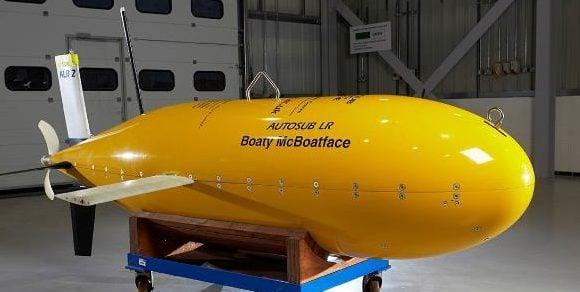 Having successfully completed sea trials, the new yellow submarine Boaty McBoatface is about to be deployed on its maiden voyage, on a research expedition to some of the the deepest, coldest waters on earth.
Having successfully completed sea trials, the new yellow submarine Boaty McBoatface is about to be deployed on its maiden voyage, on a research expedition to some of the the deepest, coldest waters on earth.
Boaty McBoatface is one of three autonomous underwater vehicles (AUV) developed at Britain’s National Oceanography Centre (NOC) designated as Autosub Long Range vehicles. Each are able to travel thousands of kilometers on missions lasting several months at a time. The NOC website notes: The ability to travel under ice and reach depths of 6000 metres will enable Boaty and friends to explore 95% of the ocean. Boaty and similar autonomous vehicles will help oceanographers investigate the processes driving change in the Polar Regions, including the extent of the ice melt, and conduct a range of research in the Arctic and Antarctic oceans without the need for the constant presence of a research ship. Scientists won’t need to wait to get access to the data, since Boaty will periodically surface and transmit the data back via a radio link.
Boaty‘s first mission will be to investigate water flow and turbulence in the dark depths of the Orkney Passage, a 3.5km deep region of the Southern Ocean. The data it collects will help scientists understand how the ocean is responding to global warming. Boaty will be carried aboard the British Antarctic Survey (BAS) research ship James Clark Ross, departing from Punta Arenas in Chile on 17 March.
The lead scientist Prof Alberto Naveira Garabato, from the University of Southampton, said: “The Orkney Passage is a key choke-point to the flow of abyssal waters in which we expect the mechanism linking changing winds to abyssal water warming to operate. We will measure how fast the streams flow, how turbulent they are, and how they respond to changes in winds over the Southern Ocean. Our goal is to learn enough about these convoluted processes to represent them in the models that scientists use to predict how our climate will evolve over the 21st century and beyond.”
If the somewhat unusual name, Boaty McBoatface, sounds familiar it is because that was the most popular choice on an internet poll to name the newest UK’s new polar research ship. The name was initially suggested by journalist, James Hand, and things got out of control, as they often do on the internet. The idea of a research vessel named Boaty McBoatface went viral and quickly became the name of choice. Adults, however, intervened and announced that the new ship will be named RSS Sir David Attenborough. Britain’s Natural Environment Research Council did promise to name a research submarine Boaty McBoatface, and they have lived up to that promise.
Boaty has beaten Sir David to the water by over a year. RRS Sir David Attenborough is still under construction and is not expected to be in service until at least 2019.
‘Boaty McBoatface’ to leave port
Thanks to David Rye for passing the news along.
